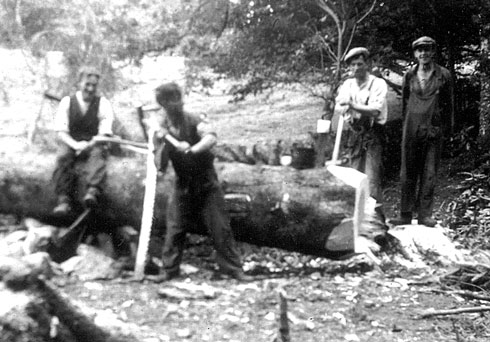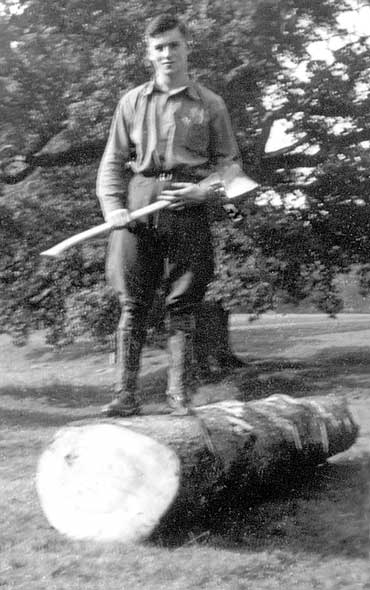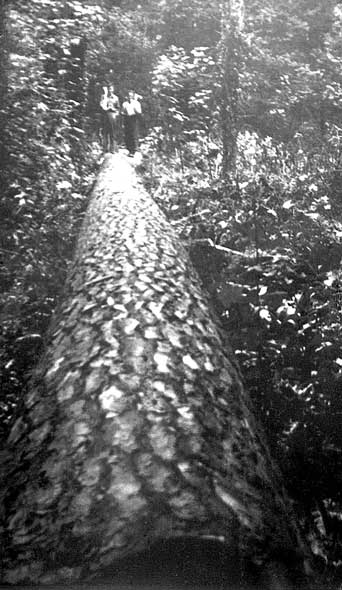My father-in-law, Geoff Cronin was a raconteur with a encyclopedic memory spanning his 93 years. He sadly died in 2017 but not before he had been persuaded to commit these memories of his childhood and young adulthood in Waterford in the 1920s to the 1940s.
The books are now out of print, but I know he would love to know that his stories are still being enjoyed, and so I am repeating the original series of his books. I hope those who have already read these stories will enjoy again and that new readers will discover the wonderful colour of life in Ireland nearly 100 years ago.
This week Geoff talks about the most popular entertainment anywhere in Ireland.. the dances and he with various of his band members played for the best part of 18 years from 1948 to 1962.. including in the packed dance hall where we now live in Courtown, Wexford.

The Dance Scene – 1950
In the 1940s, in Waterford, dancing was popular with young and middle-aged alike and was where boy met girl.
There were several dance halls, the principal one being the Olympia Ballroom, which had originally been a roller skating rink. Situated in Parnell Street it had a maple floor and could hold about twelve hundred dancers.
Next was the Large Room at the Town Hall, on The Mall. This was upstairs in the Municipal building which also held the Theatre Royal, one of the oldest purpose-built theatres in Ireland, dating back to the mid eighteenth century. The “Large Room,” as it was popularly known, had a pine floor which was regarded as the best in Waterford for dancing. It was said that you could dance all night on that floor and not feel tired – and having danced many a night there I would have to agree. Last but not least was the Red Cross Ballroom, over Burtons, in Michael Street.
These three places were the venues for the main social occasions such as the Hunt Ball, The Beagle Ball, The Military Ball, The Red Cross Ball, etc. Incidentally, functions like the Hunt Ball were known as Dress Dances, which meant white tie & tails (or dinner jacket) for the men and Ball Gowns for the ladies, and ran from 10 p.m. to 4 a.m. with supper included.
Admission would be ten shillings to twenty one shillings for the most prestigious and there would be a bar.
There were also four lesser venues: the LSF Hall (local Security Force), in William Street – now Keighrey’s Furniture Store – which emerged during the war; The Regal, in Thomas Street; The “Tubs of Blood” at the junction of the Glen and Thomas street, and the NUR Hall (National Union of Railwaymen) over Hill’s Salt Store in O’Connell’s Street. Incidentally, The “Tubs” was where the soldiers went and fights were not infrequent there, hence the name!
My first venture into the band business was in 1943, when I formed a four piece outfit – two accordions, drums and myself on piano – and I rented the “Regal” from the then owner, a man called Mullins, who had a dance licence for the hall. The rent for the hall was thirty shillings for the month and I charged one shilling and sixpence per head for admission. I also had to hire a piano, plus a cashier for the door. My career in that location was short and sweet. The opening night was packed, the second night was half full and things got progressively worse and eventually it faded out and I had to close down.
My enthusiasm had overtaken my judgement. Had I done my sums properly I’d have realised that dances, though popular, would only succeed if (a) Sponsored by a club and (b) if held on either Friday or Saturday. No dance hall could hope to run seven nights a week – and with the same band. Anyway, it was a relatively cheap lesson and I put it down to experience.
For the record the two accordionists were “Togo” Quigley and Jimmy (Fitzy) Fitzgerald and the drummer was Pierre (The Gunner) White.
***
At this time the people who “fronted” dance bands in Waterford were;
Mick O’Shea, Busty Griffin, Billy Tuohy, Hugh Dunphy, Frank King, “Pop” Walsh, Big Tom O’Brien, Billy Fahy, Geoff Cronin, Dick Cronin, Paddy Rafferty and Sadie Byrne.
The Musicians working in those years were:
Saxaphone: Big Tom, Paddy Rafferty, Ken McKinnon, Johnny Bourke, Eddie Carroll, Jimmy Power, Tommy McGrath, Dick Cooper, Billy Fahy (Clarinet), Harry Martin.
Trumpet: Johnny O’Connell, Monty Clooney, Johnny Whelan, Charlie McGrath, Frankie King.
Drums: Davy O’Brien, Pierre White, Billy Hayes, Eamon Phelan, Michael Cahill, Sean Mulcahy, Algy Fitzgerald, Eric Bremner.
Guitar: Des Manahan, Val Doonican, Bruce Clarke
Double Bass: Dick Dunphy, Paddy Kavanagh, Ernie Mosyer, Geoff Cronin.
Accordion: Drohan Brothers, Sadie Byrne, Mick O’Shea, Geoff Cronin, Dick Cronin, Billy Twohy, Busty Griffin, Jackie Chester, Jimmy Fitzgerald.
Piano: Gerry Dunne, Bruce Clarke, Geoff Cronin, Joe Manahan, Ned Roche, Martin Sullivan, Claus Cantwell, Paschal Kennedy, Maudie Tuohy.
Trombone: Derek Hyder
Vocals: Ena Galvin, Johnny Hodgers,
Apart from the above there may have been others which have escaped my memory. Also, I have not included the members of the Royal Showband who were just emerging as I was exiting the scene in 1962. By that time I had been in and out of the music business for the previous eighteen years or so and my experiences over the period would fill a book – a large one! I can, however, give you a “brief” outline of what went on.
***

Summer season in the New Ballroom in Courtown Harbour. Left to Right – Jimmy Power (Alto Sax) Mikey Denn (Drums), Jimmy Fitzgerald (accordion), G. Cronin (Piano).
To begin with I played piano with “The Hep Cats”, a six-piece formed by my brother Dick. When he went into partnership with Paddy Rafferty and the band became Paddy Rafferty’s, I continued on Piano and eventually got fired because I could only read guitar symbols.
A short time afterwards I went back to that outfit on Double Bass and did a year with them.
Meantime, Dick and I, plus drummer, did a lot of gigs in hotels as a three-piece, with me on piano.
Then Dick went to Dublin and played with Phil Murtagh the resident band in the Metropole Ballroom. He later went on to become a chemist and emigrated to Canada. At almost the same time I went to work in Dublin and did a year’s apprenticeship in Confectionary at the Swiss Chalet in Merion Row – without pay! On my return to Waterford I picked up a job with a “scrap” four-piece outfit and played for the summer season in the Tara Ballroom – May to September – in Courtown Harbour, Co. Wexford.
While living in Dublin I also pursued an interest in Ballroom Dancing which had begun when I took lessons from Irene Murray in Waterford – she had a school of dancing at the top end of Colbeck Street. In Dublin I went to the Graham School of Dancing where I took my Bronze Medal and Silver Medal. It was there also that I took my first course of study to become a teacher of Ballroom Dancing.
For various reasons I became disenchanted with the Graham tuition and I moved on to the Evelyn Burchill School where I finished my studies and passed the exam for Associateship of the National Association of Teachers of Dancing, which I got with a commendation – ANATD Comm – and also got the associateship of the Imperial Society of Teachers of Dancing – AISTD. These qualifications enabled me to teach, which I had in fact been doing while a student in both the schools.
All this was hard going and meant that in addition to my day job (8 a.m. to 5 p.m.) I was dancing every night of the week as well. It took all my spare time.
On my return to Waterford, however, all sorts of other things happened to interrupt my music “career”. First I tackled the bakery business, which my father had, and set about converting a bread trade into a confectionary business. This involved stripping down the existing bakehouse, selling off all the machinery, building a new bakehouse on a site behind the shop, building a new double-deck oven and getting new equipment installed. But just as I was preparing to launch the new venture the bank foreclosed and my father was forced to sell No. 12 John Street – it went for just £3,000!
Having received my share of the proceeds, around £400, I went into partnership with my younger brother David and we set up a mobile cinema outfit – which is the subject of a separate story.
When I returned to the Band game, a year and a half later, it was to form a three-piece – Piano, Alto Sax and Drums – and I played the first dance at The Haven Hotel, Dunmore East. This outfit grew to a four-piece and at a later stage became the resident band at the Haven when Dinner Dances became the rage and spread to the Grand Hotel Tramore, and the Majestic Hotel Tramore.
In tandem with this I ran a seven-piece band and got regular bookings at the Olympia Waterford and also the Collins Hall Clonmel, The Mayfair Kilkenny, The Town Hall Dungarvan and all points in between. On occasion I strengthened the outfit to nine pieces – Vocalist, Piano, Bass, Drums, two Alto Saxes, one Tenor Sax, and two Trumpets.
The dance scene in Ireland at this time was really swinging, to the point that it was rumoured that Bands from England would soon be coming to cash-in on the Irish market. This idea, when I thought about it, seemed quite possible and took root in my head. While I was still thinking about it I had a visit from the then Chairman of the Irish Federation of Musicians, Paddy Malone, and the General Secretary, Paddy Donaghue, who confirmed that certain promoters in Dublin had already booked the top English Bands to tour Ireland.

The Geoffrey Cronin Trio is the up-to-date combination which plays strict tempo dance music at such well-known hotels as the Grand, Tramore, and the Haven, Dunmore. (Times Pictorial, Week ending July 8th, 1950.)
On the spot we formed the Waterford branch of the Irish Federation of Musicians, and I enrolled all the members of my bands – I being the Secretary of the new branch of the “Fed”, as this powerful Trade Union was known. The Fed was going to insist that a Fed band would have to be engaged as support to any imported band appearing in Ireland.
Well, nothing happened for some months and although I tried to get other bands interested I did not succeed because people thought it wouldn’t happen, and if it did the Union would be unable to enforce the arrangement.
Meanwhile, a Sax player, whom I knew, had come back from England and settled in Waterford. He was Big Tommy O’Brien and he promptly formed his own band and got some bookings. I didn’t mind much until he began poaching some of my musicians and this I did mind because I had the best of them.
We were “daggers drawn” for a time and a regular vendetta ensued. This got neither of us anywhere and when I realised this I went to see him and we came to an “arrangement”. He would “join” my band and I would “join” his! – only it would be the same band! The difference would be that if he got the booking he would stand up and lead the “Big Tom Band” and I would sit down and If I got the booking I would lead the “Geoff Cronin Band” and he would sit down.
In this way, I gained a top class Alto player and he had the best pianist on the local scene.
The public never spotted this move and both of us did well, as we split the leader’s fee.
When the big English bands finally arrived we got ALL the support work, as the “Fed” had won their battle and we were the only “Fed” band in the area. We played support to such famous names as Jack Parnell, Harry Roy, Sid Phillips and many others.

Self on accordion at the Haven Hotel late 1950. NB. The piano needed tuning
On one memorable occasion we had a great laugh when Geraldo came to town with his 26-piece orchestra. He appeared at the Olympic Ballroom and the admission was five shillings. The attendance was about 1,200 people and during the dance my “fans” put up posters all around the hall advertising the Dunmore East Sailing Club Dress Dance, Music by the Geoff Cronin Trio – Admission 21 shillings!
To add insult to injury, at the end of the dance when Geraldo stood majestically on the band-stand, cigar in hand, preparing to sign autographs and I was at the other end of the stand merely collecting my gear, a crowd of my fans gathered in front of me screaming for my autograph and waving programmes in my face! It was a total send-up and Geraldo looked shocked and amazed. What a laugh we had.
As time went on I progressed in my day job and pressure of work, among other factors, led me to wind up the seven-piece. I continued, however, with the four-piece, doing just the Haven and the other hotels plus small club dances at the weekend. I also formed a different quartet to perform at the local Jazz Club concerts in the Municipal Theatre. In my “Spare time” I also set up a Barbershop Quartet just for fun. I called it “The Time Travellers” and it was quite successful. The members of the quartet were Eamon Phelan, Donal Gough, Des Manahan and myself.
The last performance of my band was in 1962 and though it had all been tough going I enjoyed every minute of it.

Early 1950s Trio at Haven Hotel. Left to right – Eddie Carroll (alto sax), Pierre White, “The Gunner” (drums) , Self (on piano).

Saturday Night at the Haven Hotel, Dunmore East – Summer 1959
©Geoff Cronin 2005

About Geoff Cronin
I was born at tea time at number 12 John Street, Waterford on September 23rd 1923. My father was Richard Cronin and my mother was Claire Spencer of John Street Waterford. They were married in St John’s Church in 1919.
Things are moving so fast in this day and age – and people are so absorbed, and necessarily so, with here and now – that things of the past tend to get buried deeper and deeper. Also, people’s memories seem to be shorter now and they cannot remember the little things – day to day pictures which make up the larger canvas of life.
It seems to me that soon there may be little or no detailed knowledge of what life was really like in the 1930s in a town – sorry, I should have said City, in accordance with its ancient charter – like Waterford. So I shall attempt to provide some of these little cameos as much for the fun of telling as for the benefit of posterity.
Thank you for visiting today and I hope you have enjoyed this glimpse of Waterford in the 1930s and 1940s courtesy of Geoff Cronin. As always your feedback is very welcome. thanks Sally.



















